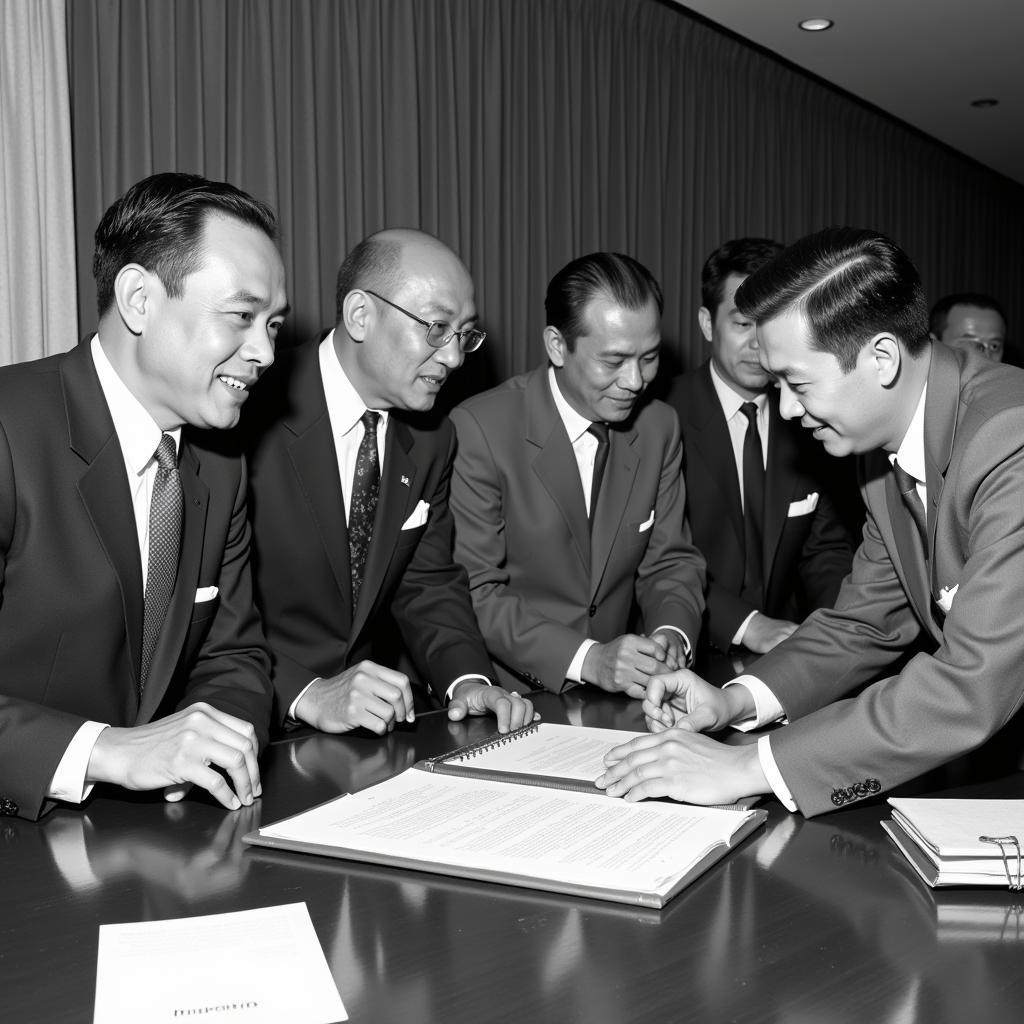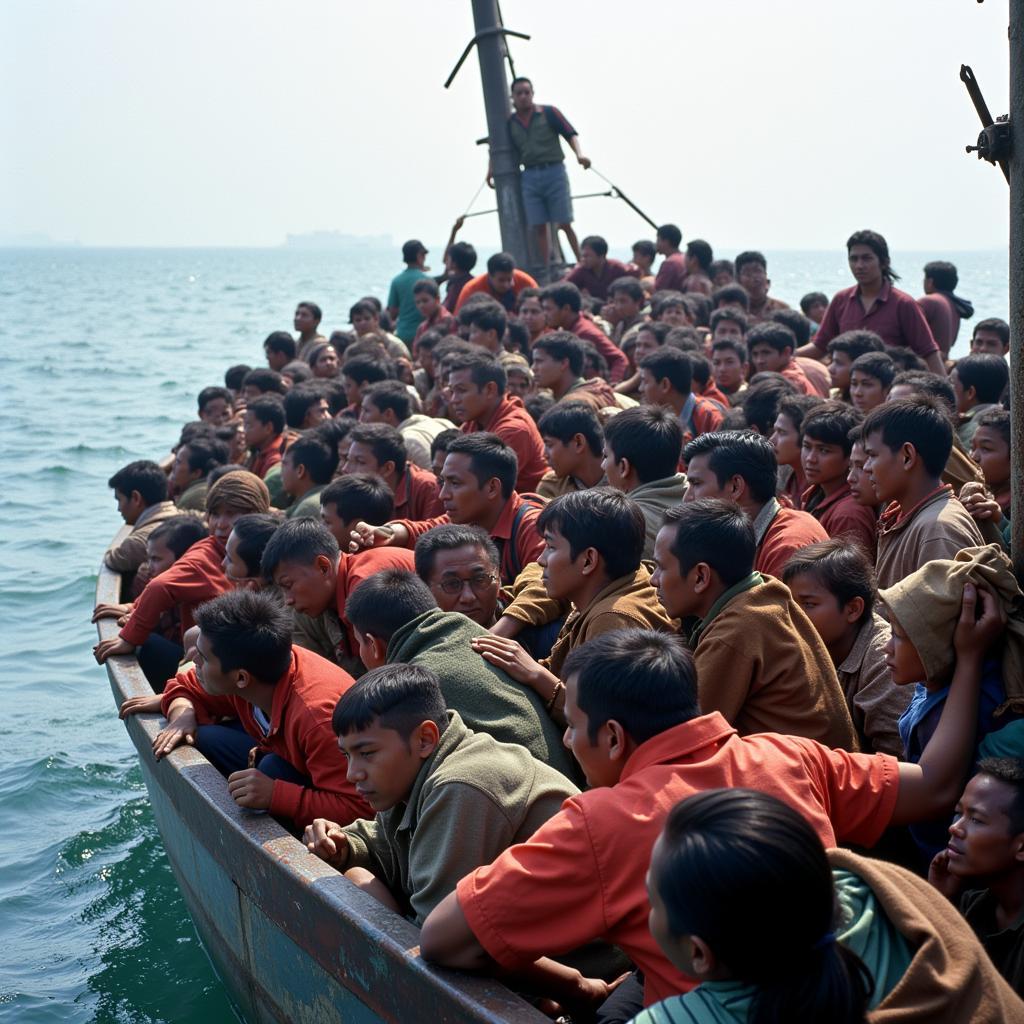The Vietnam War, a conflict that deeply scarred Southeast Asia, also played a pivotal role in shaping the Association of Southeast Asian Nations (ASEAN). While not directly involved in the war, ASEAN nations found their destinies intertwined with the conflict, leading to complex and lasting consequences. This article explores the multifaceted relationship between ASEAN and the Vietnam War, examining its impact on the region’s political landscape, economic development, and social fabric.
The Genesis of ASEAN: A Response to Regional Instability
 ASEAN Founding Fathers
ASEAN Founding Fathers
Founded in 1967 by Indonesia, Malaysia, the Philippines, Singapore, and Thailand, ASEAN emerged in a climate of intense Cold War tensions and regional instability. The Vietnam War, with its devastating consequences for neighboring countries, served as a stark reminder of the shared challenges faced by Southeast Asian nations. The conflict fueled fears of communist expansion, prompting non-communist states in the region to seek strength in unity. ASEAN’s founding principles, emphasizing regional cooperation, peaceful coexistence, and non-interference in internal affairs, reflected a shared desire to prevent further conflicts and promote stability.
Economic Impacts: Aid, Trade, and Transformation
The Vietnam War had a profound impact on the economic trajectories of ASEAN nations. While some countries, like Thailand, benefited economically from hosting US military bases and increased aid, others faced significant challenges. The war disrupted trade routes, hampered investment, and exacerbated existing economic disparities within the region. However, it also spurred industrialization and diversification in some countries, laying the groundwork for future economic growth.
The Refugee Crisis: Humanitarian Challenge and Societal Change
 Southeast Asian Refugees
Southeast Asian Refugees
The Vietnam War triggered a massive refugee crisis, with millions fleeing their homes in search of safety and a better life. ASEAN countries, particularly those bordering Vietnam, faced the daunting task of accommodating and integrating large refugee populations. While this presented significant humanitarian challenges, it also led to increased cultural exchange and demographic shifts that continue to shape the social landscape of Southeast Asia.
ASEAN’s Evolving Role: From Dialogue Partner to Regional Leader
ASEAN’s role in relation to the Vietnam War evolved over time. Initially, the organization maintained a neutral stance, seeking to avoid entanglement in the Cold War rivalry. However, as the conflict escalated, ASEAN adopted a more proactive approach, facilitating dialogue and promoting peace initiatives. Following the war’s end, ASEAN played a crucial role in regional reconstruction and reconciliation.
Post-War Relations: A Legacy of Cooperation and Reconciliation
The Vietnam War left an indelible mark on Southeast Asia, but it also underscored the importance of regional cooperation. ASEAN, with its focus on dialogue and consensus-building, has played a pivotal role in fostering peace and stability in the region. The organization’s efforts in promoting economic integration, addressing transnational challenges, and fostering a shared regional identity have helped to heal the wounds of the past and create a more prosperous and interconnected Southeast Asia.
Conclusion: ASEAN’s Enduring Relevance
The Vietnam War serves as a stark reminder of the devastating consequences of conflict and the importance of regional cooperation. ASEAN, born out of the ashes of war, has played a transformative role in Southeast Asia, fostering peace, promoting development, and shaping a shared regional identity. As the region navigates new challenges in the 21st century, ASEAN’s commitment to dialogue, cooperation, and peaceful resolution remains as relevant as ever.
FAQ:
- How did the Vietnam War impact ASEAN’s formation? The war heightened fears of communist expansion and regional instability, prompting non-communist Southeast Asian states to seek strength in unity, leading to ASEAN’s formation in 1967.
- Did any ASEAN countries participate in the Vietnam War? While no ASEAN country officially participated in the war, Thailand allowed the US to use its territory for military operations.
- What was ASEAN’s role in the aftermath of the Vietnam War? ASEAN played a crucial role in regional reconstruction, promoting dialogue, and fostering reconciliation among war-torn nations.
- How has the Vietnam War shaped ASEAN’s foreign policy outlook? The conflict reinforced ASEAN’s commitment to peaceful coexistence, non-interference in internal affairs, and the peaceful resolution of disputes.
- What lessons can be learned from ASEAN’s experience with the Vietnam War? The Vietnam War underscores the importance of regional cooperation, dialogue, and proactive diplomacy in maintaining peace and stability.
Need Support?
For any inquiries or assistance, please contact us:
Phone: 0369020373
Email: [email protected]
Address: Thon Ngoc Lien, Hiep Hoa, Bac Giang, Vietnam
Our dedicated customer support team is available 24/7 to assist you.